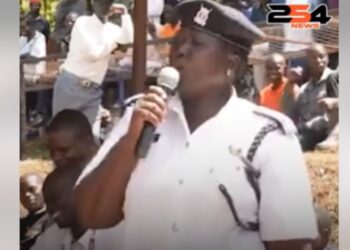Kenyans blocked the Namanga border. Tanzania protests gripped the frontier Tuesday, as police in riot gear turned back hundreds of solidarity seekers from Kajiado County attempting to cross into Arusha, where fury over rigged election results boiled into a second day of deadly clashes that have left at least five dead and the region on lockdown.
The standoff at Namanga, the dusty gateway linking Kenya’s Rift Valley to Tanzania’s northern plains, unfolded under a relentless sun around noon.
Trucks laden with maize exporters idled in limbo as officers in blue fatigues formed a human chain, batons at the ready. “We can’t let this spill over,” barked a stern-faced sergeant to a cluster of young activists waving placards reading “Justice for Tanzania”.
Among them was 24-year-old student Jemimah Kilonzo from Loitokitok, who had pooled matatu fares with friends for the trek. “Our brothers and sisters are fighting for fair votes; how can we sit idle?” she pleaded, phone aloft, capturing the pushback for Instagram Lives.
But pleas fell on deaf ears. Tear gas canisters hissed warnings, sending the group scrambling back toward acacia-dotted hills, their chants of “Solidarity now” echoing like a thwarted prayer. Across the line in Tanzania, the inferno raged unchecked.
Dar es Salaam’s harbourside avenues, usually alive with spice traders and ferry horns, dissolved into chaos as demonstrators torched effigies of ballot boxes and clashed with stone-throwing zeal.
In Arusha, the safari hub turned hotspot, crowds swelled outside the regional commissioner’s office, hurling accusations of vote stuffing after President Samia Suluhu Hassan’s camp claimed 97 per cent of tallied ballots from the National Electoral Commission.
“This isn’t an election; it’s a coronation,” roared Chadema supporter Elias Ndugu, dodging rubber bullets in a video smuggled via satellite uplink before the blackout.
The opposition, battered by pre-poll purges that jailed leaders like Tundu Lissu on flimsy treason counts, decried disqualifications that gutted their slate.
Violence peaked with five confirmed fatalities: two protesters gunned down in Mwanza and three more in Zanzibar’s spice alleys from baton beatings gone lethal. Hassan’s response was swift and iron-fisted.
By dusk Monday, curfews clamped cities from Dodoma to the coast, military convoys rumbling through like thunderheads. Airports shuttered, stranding expats at Julius Nyerere International with half-packed suitcases.
But offline, fury fermented. Bootleg radios crackled with tales of ballot raids, where armed youth in party colours snatched urns under moonlight.
For Kenyans at Namanga, the block felt personal. Border commerce, a lifeline for Maasai herders swapping goats for Tanzanian fabrics, ground to zero.
“My stall’s empty; no customers, no cash,” grumbled Mama Mboga. Fatuma Ole, 48, who shuttles sukuma wiki bundles daily.
Her stall, a patchwork of burlap under a neem tree, stood barren, flies buzzing over unsold greens. Youth like Kilonzo saw echoes of Kenya’s own 2022 hustles, where Gen Z toppled tax hikes with hashtags.
“Tanzania’s pain is ours; borders don’t bind brotherhood,” she posted later from a borrowed hotspot in Kajiado town. Kenyan officials, wary of contagion, beefed up patrols with anti-riot squads from Nairobi, while Foreign Affairs Minister Korir Sing’oei urged calm in a mid-afternoon tweet.
“We support peace; no meddling in neighbours’ affairs.” The ripple hit economies hard. Tanzania’s tourism, a $2.5 billion earner, teetered as Kilimanjaro trekkers rerouted to Uganda.

















